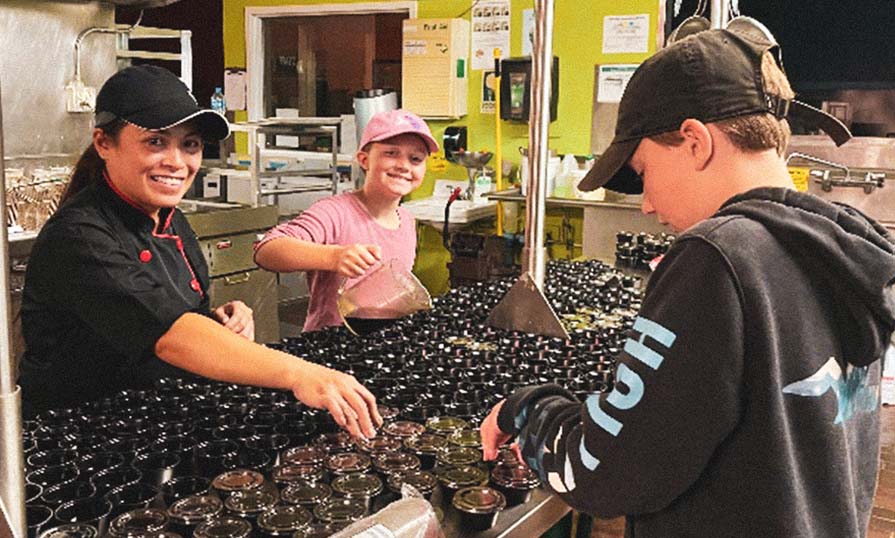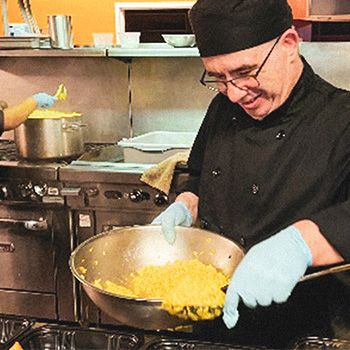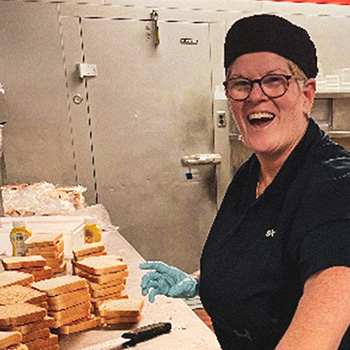Caring for our communities

Over the 2022-23 academic year, Nova Scotia faced a series of devastating natural disasters. These included Hurricane Fiona, wildfires in Shelburne County and Halifax Regional Municipality and, several weeks later, significant flash-flooding in several communities. Severely damaged homes and vehicles, lost agricultural crops and widespread power outages dominated news headlines as people worked to repair and restore their homes and communities. The impact of these events on our NSCC community was substantial, as was the caring response by so many staff, students and donors.
The stories below illustrate both the resiliency and caring nature of our pan-provincial community.
Marconi Campus shows community spirit following Hurricane Fiona
In September 2022, torrential rainfall, downed trees, fallen wires and violent winds knocked out power for many Nova Scotian residents, most severely impacting power infrastructure on Cape Breton Island.
Hundreds of powerline technicians flocked to the region to help with restoration efforts caused by Hurricane Fiona, but the lack of power to restaurants and grocery stores made it difficult for workers to access food.
Although Marconi Campus was also without power, it wasn’t long before a dedicated group of employees returned to the campus eager to help their community. What started out as a request to help provide one meal for a crew of workers, turned into a three-day effort to prepare hundreds of meals.

True Cape Breton spirit
Marconi Campus Principal, Carla Arsenault, explains the challenges they faced to return to campus. “Nobody had power and it was difficult for people to get around because gas stations were running out of fuel,” she says.
Although many of the Marconi team were personally impacted by the hurricane, they returned to campus and prepared meals so workers could continue with restoration efforts. Carla says there were many who came together to help.
“Our facilities team quickly ensured that the building was safe and took the necessary steps to get the generator running, fueled and that all aspects of the operation of our building were taken care of. Our facilities manager made sure the building was staffed during the entirety of the storm,” she explains. “Of course, we couldn’t have done it without our head cook and cafeteria staff who helped in so many ways. A lot of the management team came in, filled bags and prepped food. Even my kids came to help,” she adds.

Challenging conditions
Carla recalls the challenging conditions to prepare food using only a generator. “I remember one of our cafeteria workers slicing sandwich meat and cheese in the hallway. She had to wheel the cart out there to get a plug where we had light so she could see,” says Carla. “Dinner was the largest to prepare which was nearly 700 meals of Chinese food with dessert. It was a lot of work to get that meal out the door, especially on the same day that we had already prepared other meals. But, with everyone pitching in, we were able to make it happen.”
Over a period of three days, employees prepared and packaged hundreds of meals to Nova Scotia Power staff. They were then distributed to the workers and contractors from a temporary centralized hub set up in the Mayflower Mall parking lot in Sydney.
Carla says that the logistics and effort behind preparing such a high volume of meals without notice and in a building powered by generator was only possible because of the remarkable efforts of the Marconi team.
Restoration crews later presented the volunteers with a plaque that is now on display at the campus. “The employees at Marconi Campus went above and beyond and really showed the spirit of community and the importance of coming together in a time of need.”
Burridge Campus hosts evacuated senior home residents during wildfires
Six months later, Nova Scotia faced another devastating event in May, when wildfires broke out – first in Shelburne County and then in the Halifax Region.
As fires grew out-of-control, community members were evacuated and our campuses were called on to help. Burridge Campus Principal Mary Thompson will never forget the call she received at 11 pm on a Wednesday night.
The Bay Side Home for seniors needed to relocate quickly and they were looking to the campus to host them. “The next morning, employees joined us in the cafeteria and we explained the request,” she says. Fifteen minutes later, nearly 50 staff began clearing the cafeteria, the nursing labs and classrooms to create a temporary home for the seniors of Bay Side Home.

Creating a welcoming space for seniors
Mary says that staff contributed in many ways to create a comfortable, safe and welcoming temporary home for the seniors. From transporting and setting up portable hand-wash stations, furniture and space dividers, to delivering personal belongings to each senior, it was a team effort and required many hands. She says the volunteers wanted to ensure everyone felt as safe, comfortable and settled as possible. “We arranged to have the Saint John Ambulance therapy dogs come in and visit, we set up the big screen TV in the cafeteria so they could watch movies and tried to make it feel as normal and comfortable as possible,” she adds.
The seniors stayed at the campus for one week and, when it came time for them to return to Bay Side Home, the volunteers continued to step up. “That following Thursday they were able to return, so we worked in reverse,” says Mary. “Some of us helped move seniors to the buses, some loaded trucks. One staff operated the forklift for hours lifting the beds up onto the trucks. It was a community effort from start to finish.”
Mary says she feels incredibly lucky to work among individuals who are always willing to help. “Not one person said, ‘I’ve got too much to do, or I can’t be doing this’. In this situation, everybody pitched in,” she says. “They always go above and beyond. Always.”
Lunenburg Campus provides shelter during flash flooding
In June, just weeks following the wildfires, more than 100 millimetres of rain fell within a short period, creating flash flooding in western Nova Scotia.
During the morning of July 22, Lunenburg Campus Facilities Manager Adam LePage received a call from the local Emergency Management Organization asking if he would be willing to keep Lunenburg Campus open for the night to accommodate 10 to 12 residents of the Fancy Lake area. They were being evacuated from their homes as a precautionary measure during the flooding.
Adam, along with campus security guards and facilities support staff were quick to help. “We had very accommodating staff who came in and worked overnight – including security guards and a couple of facilities staff – who made sure the washrooms were clean and that the evacuated community members had access to the things they needed,” Adam explains.
Red Cross provided cots, bedding, boxed lunches, snacks and other essential items. “They had their own staff there to tend to any needs that the guests had. We made sure that the building was secure, clean and remained open during the time that was needed,” says Adam.
Adam says that accommodation at Lunenburg Campus was required for one night and that although the flooding left guests a little startled and worried, they felt comforted that they had a safe place to stay. “Considering the circumstances, they all seemed very positive.”
Financial support for students
The aftermath of Hurricane Fiona, the wildfires and flash flooding also left many students in a vulnerable position. Some students were without power, phone service, and reliable internet access. Many also experienced food insecurity.
Ashley Power, Acting Executive Director with NSCC Foundation and Alumni Relations, says the urgent and shifting landscape of need for our students resulted in the creation of Rapid Response, a donor funded program that allows the College to respond quickly to support students when natural disasters occur.
“Thanks to the generosity of donors who support Rapid Response, we are able to move quickly and in ways that not only help our students stay focused on their studies, but also let them know they are part of a community that cares about their wellbeing,” says Ashley.
Rapid Response addresses the immediate and emerging needs of students at each of our 14 campuses and supports initiatives like emergency housing, the laptops program and cost-of-living bursaries. One student who received the bursary says, ”It helped me continue with my studies without falling behind and took a huge load off my mind.”
With support from our donors and funds established by NSCC Foundation, approximately 300 emergency Hurricane Fiona relief bursaries and more than 50 emergency wildfire bursaries have been deployed in support of students in urgent need.

